Follow-Up Visits
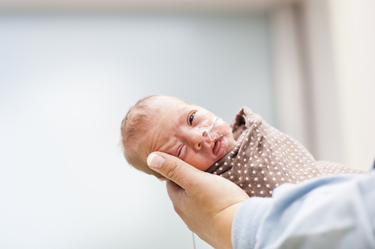
PreMRI
*Visits based on adjusted age.
6 month visit
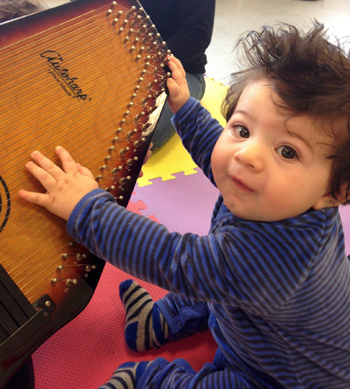 • Neurological exam
• Neurological exam
• Optional brain MRI
• Duration: 3 hours
Neurological examination
This exam assesses motor and sensory skills, the functioning of one or more cranial nerves, hearing and speech, vision, coordination and balance, among other abilities.
Optional MRI scan
This scan will help us to evaluate how the brain has responded to any injury that might have occurredat birth. Intravenous (IV) sedation will be used to make sure your baby’s head remains still. The medications used are standard drugs given to infants for such procedures and doses used will be the minimum necessary and within safe ranges. To minimize any risks during the scanning, heart rate, blood pressure and blood oxygen are monitored, and your baby will be accompanied by trained physician and nursing staff at all times. If you do not consent to sedation, your baby will not be able to receive the optional scan.
12 months visit
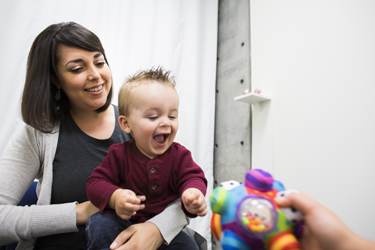 • Developmental assessment
• Developmental assessment
• Neurological exam
• Duration: 2 hours
Developmental assessment
The Bayley Scales of Infant Development (BSID-III) is a standard series of measurements used primarily to assess the motor (fine and gross), language (receptive and expressive), and cognitive development of infants and toddlers, ages 0-3.
Neurological examination
This exam assesses motor and sensory skills, the functioning of one or more cranial nerves, hearing and speech, vision, coordination and balance, among other abilities.
18 months visit
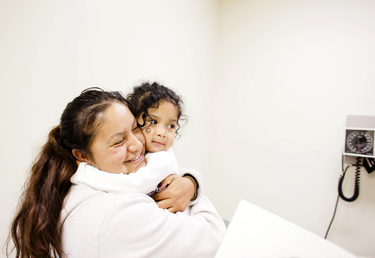 • Developmental assessment
• Developmental assessment
• Neurological exam
• Duration: 2 hours
Developmental assessment
The Bayley Scales of Infant Development (BSID-III) is a standard series of measurements used primarily to assess the motor (fine and gross), language (receptive and expressive), and cognitive development of infants and toddlers, ages 0-3.
Neurological examination
This exam assesses motor and sensory skills, the functioning of one or more cranial nerves, hearing and speech, vision, coordination and balance, among other abilities.
2.5-year visit
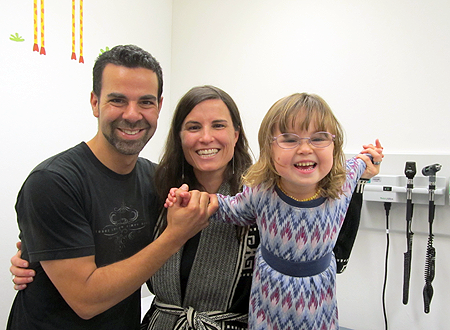 • Developmental assessment
• Developmental assessment
• Neurological exam
• Duration: 2 hours
Developmental assessment
The Bayley Scales of Infant Development (BSID-III) is a standard series of measurements used primarily to assess the motor (fine and gross), language (receptive and expressive), and cognitive development of infants and toddlers, ages 0-3.
Neurological examination
This exam assesses motor and sensory skills, the functioning of one or more cranial nerves, hearing and speech, vision, coordination and balance, among other abilities.
4-year visit
 • Cognitive testing (IQ test)
• Cognitive testing (IQ test)
• Neurological exam
• Duration: 2 hours
Cognitive testing
The Wechsler Preschool and Primary Scale of Intelligence (WPPSI) scores thatis a tool that measures represent intellectual functioning in verbal and performance cognitive domains, as well as providing a composite score that represents a child’s general intellectual ability. This cognitive testing is performed by a developmental psychologist and consists of a series of games, puzzles, and questions. Results may be shared with the family upon request.
Neurological examination
This exam assesses motor and sensory skills, the functioning of one or more cranial nerves, hearing and speech, vision, coordination and balance, among other abilities.
8-year visit
 • Educational testing/IQ test
• Educational testing/IQ test
• Neurological exam
• Duration: 2 hours
Cognitive testing
The Wechsler Intelligence Scale for Children generates an IQ score that represents a child’s general cognitive ability. This cognitive testing is performed by a developmental psychologist and consists of a series of games, puzzles, and questions. Results may be shared with the family upon request.
Neurological examination
This exam assesses motor and sensory skills, the functioning of one or more cranial nerves, hearing and speech, vision, coordination and balance, among other abilities.
10-14 years visit
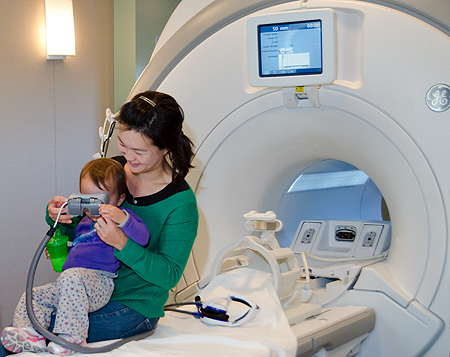 • Educational testing/IQ test
• Educational testing/IQ test
• Optional brain MRI
• Neurological exam
• Duration: 3 hours
CinemaVision goggles allow for children to watch a video while being scanned.
Cognitive testing
The Wechsler Intelligence Scale for Children generates an IQ score that represents a child’s general cognitive ability. This cognitive testing is performed by a developmental psychologist and consists of a series of games, puzzles, and questions. Results may be shared with the family upon request.
Neurological examination
This exam assesses motor and sensory skills, the functioning of one or more cranial nerves, hearing and speech, vision, coordination and balance, among other abilities.
Optional MRI scan
This scan will help us to evaluate how the brain has responded to any injury that might have occurred. No sedation will be used. Your child will be asked to lay still for about an hour, with short breaks every few minutes. In order to keep your child comfortable, he/she may be able to wear headphones and watch a movie.
Learn more about how you can help prepare your child for an MRI scan.
- Research Directory
- Abdominal and Pelvic MRI
- Arthritis Imaging Lab (Li Lab)
- Baby Brain Research Group
- Biomagnetic Imaging Laboratory
- Biomechanics & Musculoskeletal Imaging Lab
- Bone Quality Research Lab
- BrainChange Study
- Breast Imaging Research Group
- Breast and Bone Density Group
- Cardiothoracic Imaging Imaging Research
- Center for Molecular and Functional Imaging (CMFI)
- Contrast Material and CT Translational Research Lab
- Evans Lab
- Focused Ultrasound Lab
- High Field MRI Center
- Imaging Research for Neurodevelopment
- Interventional Radiology Research Lab
- Larson Group
- Lupo Lab
- Multimodal Metabolic Brain Imaging
- Musculoskeletal Quantitative Imaging Research
- Neural Connectivity Lab
- Osteoid Osteomas HIFU Clinical Trial
- PET/SPECT Radiochemistry
- PSMA PET Scan
- Physics Research Laboratory
- Program for Molecular Imaging and Targeted Therapy
- Prostate Cancer Imaging Lab (Kurhanewicz)
- Quantitative Biomarkers & AI in MSK Imaging
- Research
- Sarah J. Nelson Lab
- Surbeck Laboratory
- Translational Metabolic Imaging Lab
- Vascular Imaging Research Center
- Viswanath Lab
- Wilson Lab
- Imaging Research Symposium
- Research Conference
- UCSF Radiology at RSNA
- Core Services
Fetal MRI
For Fetal MRI follow-up information, please contact:
Orit Glenn, MD
Phone: (415) 353-2526
Email: [email protected]
